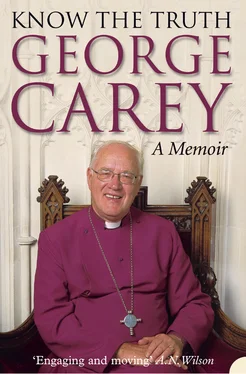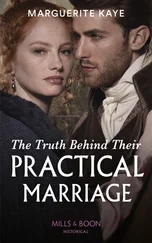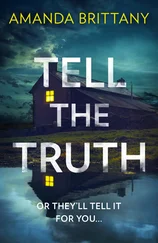My mother, Ruby Catherine Gurney, came from a more secure and more prosperous working-class home – although the same struggle for existence blighted her life too. Looking at the earliest photos I possess of my mother, she was clearly a good-looking and gentle woman, intelligent, full of life with a great sense of humour. She too was from a large family, and like my father did not have the chance of a decent education.
It was not until many years later that I discovered the extraordinary fact that my mother’s side of the family had close links with Canterbury. My mother’s great-great-grandparents, Thomas and Mary Gurney, were born in Canterbury and baptised in St Alphege’s Church, just fifty yards away from the Old Palace. Their son James was married to Louisa Dawson in the same church on 26 March 1849, and their place of residence was recorded as Archbishop’s Palace, Canterbury. The Gurney family later moved to the East End of London, where my mother was born and grew up. One firm recollection of my parents, sharply etched in my memory, is the fact that they remained in love and cherished one another throughout their lives. I have no memory of them ever having an argument, and with their children they would rely on kindness and good humour to resolve any tense situation.
At some point shortly before the war my parents moved to Dagenham in Essex, which was just as well, as 68 Fern Street was badly damaged during the Blitz. We moved to a larger council house with three bedrooms. The houses around swarmed with young families, and the small number of cars on the roads meant that children could play safely on most of the sidestreets. Impromptu football matches started after school on most days. At the age of five I was enrolled at Monteagle Primary and Junior School, just a few minutes’ walk from home. Later in life I was surprised to discover that my academic year at Monteagle School was not only to yield a future Archbishop of Canterbury, but also a senior officer in the Royal Air Force and the captain of a Cunard liner.
My recollections of those early years are exceedingly vague, and consist of a kaleidoscope of war memories: the excitement of being bundled into underground shelters, the shattering of the calm order of life through three evacuations to Wiltshire, the drone of planes overhead, the sound of the dreaded ‘doodlebugs’ and the destruction they wrought. A tremendous camaraderie developed among the families in our road, and people went to great lengths to support one another, even to the degree of sharing rations if the children did not have enough to eat. Dad became very accomplished at making toffee, and Mum’s cooking became highly inventive, as she had to make do with whatever ingredients she had to hand to produce food for us all. Dad was not called up, but was involved in essential services’, working at Ford’s motor company churning out tanks and armoured vehicles for the army. Often after work he had to take his turn of duty as one of the Home Guard. As youngsters we were tickled pink to see our father donning his uniform, cleaning his Lee-Enfield rifle and parading with other members of his brigade to different parts of the city. In later years I could never watch BBC TV’s Dad’s Army without thinking of my father.
At times in the early days war did seem exciting and rather intoxicating. A sense of urgency gripped the nation, and that feeling of living on the edge of survival penetrated even the world of children of my age. It was impossible to escape the business of war. We knew we were living in desperate days. During the day barrage balloons filled the sky, and the unmistakable traces of fighter-plane tracks high in the heavens were witnesses to the dogfights going on far above us. I became all too familiar with the sound of the ‘doodlebug’, the German V1 rocket, which did so much damage to the East End. I learned that if you could hear it you were safe. It was when the engine cut out that you knew its journey was over, and you had better run for cover. Sadly, my best friend at school, Henry, was badly injured in a doodlebug attack. War invaded our daily lives – everyone, it seemed, had at least one relative in the forces, and at school assemblies prayer was earnest. All children learned how to put gasmasks on, and took in their stride regular visits to the air-raid shelters in the back garden – even though the dirty conditions and the presence of spiders made such times less than appealing.
War also intruded on our diet, in the form of rationing, which affected every person in Britain. Everyone had a ration book, and food was rigidly controlled, with priority given to expectant mothers and children. With five children, my parents had a hard time ensuring that we all received adequate nourishment. But while everyone was hungry in wartime Britain, no one starved. The irony is that, despite people having to go without, on the whole rationing meant that the nation was better fed than it had been in the 1930s. People preferred equality to a free-for-all in which the well-off might stockpile food and the poor starve. Poorer families such as ours were entitled to free school meals. Some of my most exciting memories are of my father saving enough sugar to make fudge for all the family.
There were periods when the level of bombing in London meant that children had to be evacuated to safe country areas. That happened to us three times, but thankfully, at least when we had to leave the security of home – in spite of the dangers of bombs – we had the reassuring presence of our mother with us. Many a London child of my generation has reason to be grateful for the wonderful care of country people who could not have been kinder and more welcoming to the city kids with their unruly behaviour and their ignorance of the ways of rural communities.
There was, however, one terrible experience which was imprinted on the memory of us all, when Mother fell out with a family with whom we were staying in Warminster. A deserter came to the door one day asking for bread, and Mum gave him some. The woman who owned the house was furious with her, and a violent argument ensued. The woman then told Mother that she was totally fed up with us all – we must go. We left in a hurry, and returned to London. But Mum only had enough money to reach Paddington, and Dad had no idea we were on our way home. It was very late in the evening when the train arrived, and we were all wretchedly tired. I remember that the younger ones were crying, and Mum was forlorn and exhausted. Suddenly, to our relief and joy, a neighbour recognised Mum and greeted her: ‘Ruby! What on earth are you doing here so late? Why, you all look in need of a good meal.’ Mum, in tears, explained her predicament, and the good Samaritan bought us all fish and chips and gave us the money to complete our journey home. It was one of those moments forever treasured in our family history. For my parents it was a real sign that ‘Someone’ was watching over us all.
But we could not stay in Dagenham, it was far too dangerous, and once more we were evacuated – this time to Bradford-on-Avon and to a remarkable family, the Musslewhites, whose kindness we always remembered. Mr Musslewhite was the billeting officer and also churchwarden of Christ Church, Bradford-on-Avon. It was his job to match children and families with hospitable homes. I was told by one of his children that when he came face-to-face with Mrs Ruby Carey and her five offspring he was so touched by this very close family that, acting on impulse, he decided: ‘We will take in this family ourselves.’
We stayed with them for several weeks before a house was found on White Hill, which became our home until it was safe to return to Dagenham. Mr Musslewhite and his family also helped us in more than practical ways. He helped to reconnect us with our church, because it was entirely natural to go to his church every Sunday and to enter into the rhythm of worship and praise, community life and the care of one another. For us children it also meant education at the local church school, which we greatly appreciated. Ever since those days Bradford-on-Avon has had a special place in our affections.
Читать дальше












